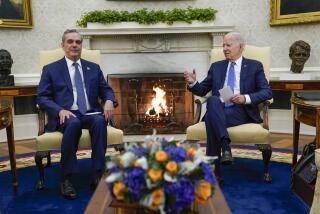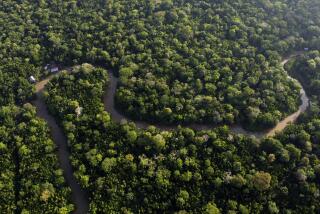Latin American Presidents End Talks With Plea to Limit Interest Rates
- Share via
ACAPULCO, Mexico — Eight Latin American presidents on Sunday called for commercial and international lending agencies to limit interest rates on the region’s crushing $380 billion foreign debt as a means of solving their five-year crisis.
In a final document issued after three days of talks here, the presidents said two immediate priorities are to ensure sufficient lending on adequate terms from commercial banks and to set limits on interest rates. They set no target figures for new interest rates in the 30-page manifesto.
The meeting was the largest gathering of its kind since 1967 and the presidents of the eight nations also used the occasion to endorse Nicaraguan peace plan signed by their Central American counterparts Aug. 7.
The Latin American presidents said current debt strategy has so far failed to tackle the problem, and that the negotiating process is still too long and complex.
“The negotiations . . . represent only temporary palliatives and don’t constitute a permanent solution to the problem,” the final document said.
Using Too Much Capital
The region’s economic crisis has forced its nations to pay too much of their capital to service debt to foreign nations, robbing the governments of their ability to deal with internal social problems and increasing poverty, the document said.
“In the countries of the region, the social effects of the crisis are also reflected in a reduction in public expenditures on education, health, housing, infrastructure and services,” the presidents said. “Leeway in economic and social policies has been limited and . . . poverty has increased while there are few opportunities for employment and progress.”
Nevertheless, the presidents stopped short of joint unilateral measures such as a moratorium on debt payments and said the interest rate should be set through negotiations with creditors. At the same time, they said banks should help finance interest payments.
Argentina had previously proposed interest rates be fixed at around 4%, the level prevailing in the 1970s when Latin America began its borrowing spree. At the opening session here, Peru’s President Alan Garcia had urged a set rate for Latin American debt.
The document also calls for mechanisms that allow debtors to take advantage of the discount available on their debt so as to reduce their payments, expand mechanisms to compensate for events beyond the control of debtors--such as rising interest rates--and increase resources available to multilateral lending agencies.
On the last point, the presidents agreed to seek a revision of International Monetary Fund policies to ensure adjustment with growth, stimulate an active role for the World Bank and keep the Inter-American Development Bank as a multilateral institution.
The IADB has been the subject of an 18-month battle between Latin America and the United States over Washington’s proposals to alter the bank’s voting structure so as to give it virtual control over lending to the region.
They also agreed to seek an end to the common practice linking various loan agreements. At present, failure to comply with the terms of one agency program can affect disbursements of another agency’s loans.
Support Poorer Nations
Other recommendations were to urge creditor governments to relax terms on export credit, give support to lesser developed nations in negotiating their debts, and negotiate a direct link between debt payments and access of debtor country exports in trade talks under the current General Agreement on Tariffs and Trade round.
The negotiations for better debt terms will be coordinated among the Latin American governments, and if insufficient progress is made the document says individual countries might take unilateral action.
That appeared to be a reference to Peru, which has restricted payments on its $14.5 billion foreign debt to 10% of its export earnings, a figure far lower than required by its lenders.
The presidents attending the session were Miguel de la Madrid of Mexico, Jose Sarney of Brazil, Alan Garcia of Peru, Eric Arturo Delvalle of Panama, Virgilio Barco of Colombia, Jaime Lusinchi of Venezuela, Raul Alfonsin of Argentina and Jose Maria Sanguinetti of Uruguay.
More to Read
Sign up for Essential California
The most important California stories and recommendations in your inbox every morning.
You may occasionally receive promotional content from the Los Angeles Times.













